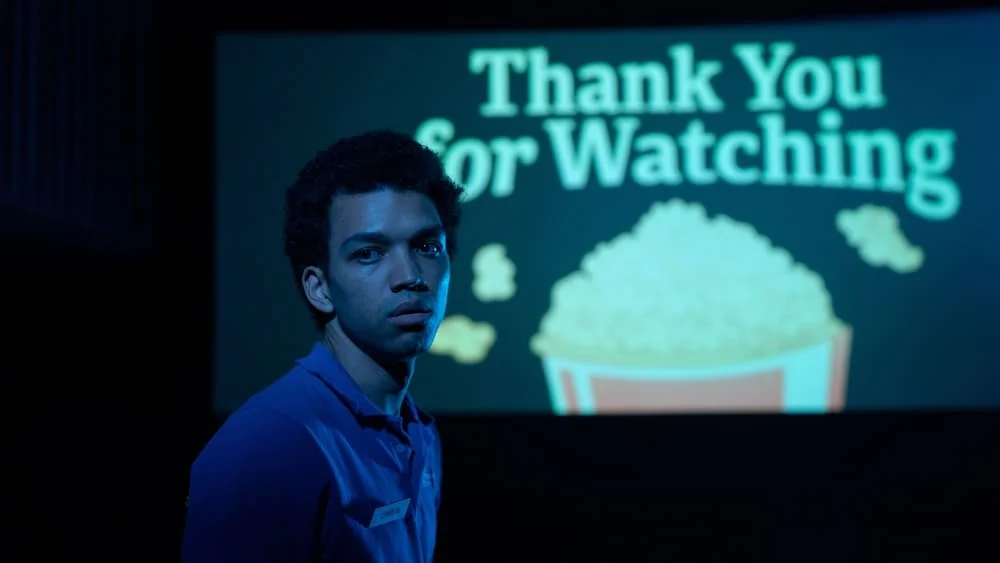Jane Schoenbrun is one of the sharpest working filmmakers today when it comes to dissecting our relationship with the media we consume. Their previous feature “We’re All Going to the World’s Fair” was a provocative internet-horror film about isolation in a completely connected world. We can meet anyone with just a few clicks and reach a wide audience while maintaining the intimacy of a one-on-one conversation. And yet, we are alone. There are thousands of people out there just like us, but we’ll never actually make a meaningful connection with them because the means of our connections are increasingly inhuman. Our overreliance on media to help us form our connections is the primary driver of our loneliness.
Their new film “I Saw the TV Glow” plays with similar ideas, but shows that this isn’t a problem of the internet age, we’ve always dealt with this. More importantly, the film is interested in the value of media as an escape and a means of self-discovery. The film is a period piece that starts in the mid-1990s and at various points skips through time. Most of the action centers around a young boy, Owen, who develops a fascination with an older girl, Maddy, who likes the same young adult WB-esque TV melodrama that he has been curious about. He’s not necessarily drawn to her by attraction or even common interests, but they bond after she introduces him to the show and smuggles him VHS tapes of episodes he missed.
The show is more than just a show to the two of them. To Maddy, “The Pink Opaque” represents an escape from her abusive stepfather, a world that feels familiar but different enough from her own that she can focus on something other than her problems for once. Her parasocial relationship with the main characters allows her an outlet to express her sexuality at a time when lesbianism was not widely accepted in society. The show’s function as an outlet for Maddy is great, but when it is her only means of happiness in her isolated suburban town, her relationship with the show becomes unhealthy. It convinces her to escape her abusive home, but her only knowledge of the world outside her town is via a fantasy show. When life free of her family isn’t what she thought it might be, her delusions about what her life should be like drive her to suicide, asking to be buried alive like the characters in her favorite show in the series finale.
Owen’s relationship with the show is different but equally unhealthy. To him, watching the show allows him to embrace femininity and we see someone uncomfortable with their gender and sexuality finally able to start exploring it after watching this show. It’s important to Owen to have an outlet to find his true self, but he never fully embraces it. He compartmentalizes that part of himself because the show is just fantasy, it’s not real life. It’s an escape, not something that could actually apply in real life. At least, that’s what he tells himself and Maddy (or at least an imagined Maddy) when she returns to see him still stuck in their hometown a decade later. “The Pink Opaque” is a comfort to Owen, not a potential vessel for his own self-expression. Of course, art is a critical mode of expression and self-reflection. But viewing it as merely content to be consumed robs it of that power. That’s why when Owen, in his middle age, finds the entire series on streaming, it no longer has the same effect on him. He has buried his true self and let the show that could have freed him become another thing to watch.
“I Saw the TV Glow” is genuinely upsetting in a way that most films couldn’t dream of being. The ethereal soundtrack is interrupted at various points by raw, painful screams. The characters are trapped, and their only solution is to cry out, to break things, and to hurt themselves. It is heartbreaking to know that this is how so many people who have struggled with their gender identity and their sexuality have had to live because they just didn’t know any other way. One of the few ways to make sense of themselves is media and, when it’s somebody else’s media and not your own, it can be taken from you because some executive didn’t find it profitable enough to continue making. Relying on that media as your only escape is dangerous, but for those who don’t know how to describe what they’re feeling and don’t feel accepted enough to talk about it, what other choice do they have?

